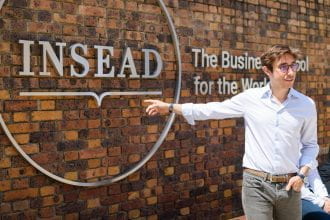In January 2019, the INSEAD Hoffmann Global Institute for Business and Society did something that has not been done at the school before. In Davos, alongside the World Economic Forum (WEF), the Institute convened faculty and alumni and key leaders from business, government, foundations and civil society to discuss the role of business education in global development. As partners of the SDG Tent, the Hoffmann Institute hosted a conversation on accelerating progress towards the SDGs by promoting business as a force for good.

The 2019 WEF opened against mounting evidence of pressing global challenges. For the third year in a row, environmental risks exacerbated by climate change topped the WEF Global Risks Report. For the fifth year in a row, Oxfam showcased the rising income gap between the extremely rich and the extremely poor. The Edelman Trust Barometer shows that we are several years into a global trust crisis.
In this year’s Trust Barometer report, 75% of the 33,000 people surveyed in 27 countries trusted their employer to “do what is right”. And 67% expected them to take action on pressing societal issues. That is three times more than the level of trust they place in their government. So how do we prepare future leaders and managers to do the right thing and meet these expectations?
The INSEAD events in Davos aimed to shine light on this question and bring together leading voices to discuss possible solutions.
In the tent, the Institute hosted sessions on business education, new business models in Africa and the future of leadership. Among participants were CEOs from companies such as DSM and Upwork, as well as NGOs and foundations such as the European Research Council and Bill and Melinda Gates Foundation. These leaders joined INSEAD deans, faculty, alumni and Hoffmann Institute Advisory Board members.
The WEF in Davos provides an opportunity to meet with global leaders and discuss crucial issues that shape social and economic development. The Hoffmann Institute brought the perspective of business education to this discussion with three sessions.
Transforming Business Education
Our first panel on Transforming Business Education explored how to inspire new sustainability champions and design business models that benefit business, society and the planet. A key call to action was to make leadership more humane and bring humanity to business education. Dean Ilian Mihov highlighted the school’s commitment to lead in transforming business education so leaders and their organisations deliver societal progress.
In a free-flowing discussion, former CEO of Unilever Paul Polman implored leaders “to be a human being first and foremost,” and called for bringing humanity back to education. Subi Rangan, Professor of Strategy and Management at INSEAD, dug deeper and said, “We produced an economy that is focused on output but neglects outcomes… There is a more promising solution – let’s educate power! Recruit for character, develop for competence.”

This panel and the ensuing discourse provided insight on the role of business education in a world where emergent risks require dynamic and globally-minded leaders.

Innovative Business Models in Africa
The second session was a working lunch focused on innovative business models in Africa. Limited to 30 participants, this intimate conversation was led by INSEAD Professor of Technology and Operations Management Luk Van Wassenhove. The working lunch identified concrete actions to transform business and accelerate progress towards the SDGs in Africa. A key take-away was the need for a system approach that recognises and reconciles the complex interaction between economic, social well-being and environmental sustainability objectives.
The session provided guidance for INSEAD to shape its engagement in Africa. Our position as a business school that promotes innovative, inclusive business models built on strong leadership and sound governance resonates with leaders poised to transform the continent.
The Future of Leadership
The last panel on The Future of Leadership encouraged sharing of insights on how leaders can navigate the increasingly complex business and governance landscape of the digital age. Sue Desmond-Hellmann, CEO of the Gates Foundation, said, “It is exhilarating to be pushed as a leader but humbling to be reminded that all of us need to know what is expected from us, what will drive impact in our organisation and how we can learn and grow.”
This idea that leadership is changing was echoed by the panel. CEO of DSM Bright Science Brighter Living Feike Sijbesma said, “You are nothing without the people who see you as a leader… Taking responsibility for other people is critical.”
At the closing of our panel on The Future of Leadership André Hoffmann MBA’90D, Chair of the Hoffmann Global Institute for Business and Society Advisory Board, said, “No one has mentioned profit as a measure of success. There’s a new sense of humility in business leadership.” The Hoffman Institute hopes to highlight leaders who are creating value for communities as a core feature of their business model.
The SDG Tent is a well-known place for leaders to meet – leaders of business and finance, of governments and multilateral institutions, and thought leaders shaping the direction of development. INSEAD adds leaders of business education to that list.

The Hoffmann Institute would like to thank all our 2019 SDG Tent partners – DSM, Salesforce, Sustainable Trade Initiative, Cargill, Circle Economy and others. This story was first published on the Hoffmann Institute Stories page.


